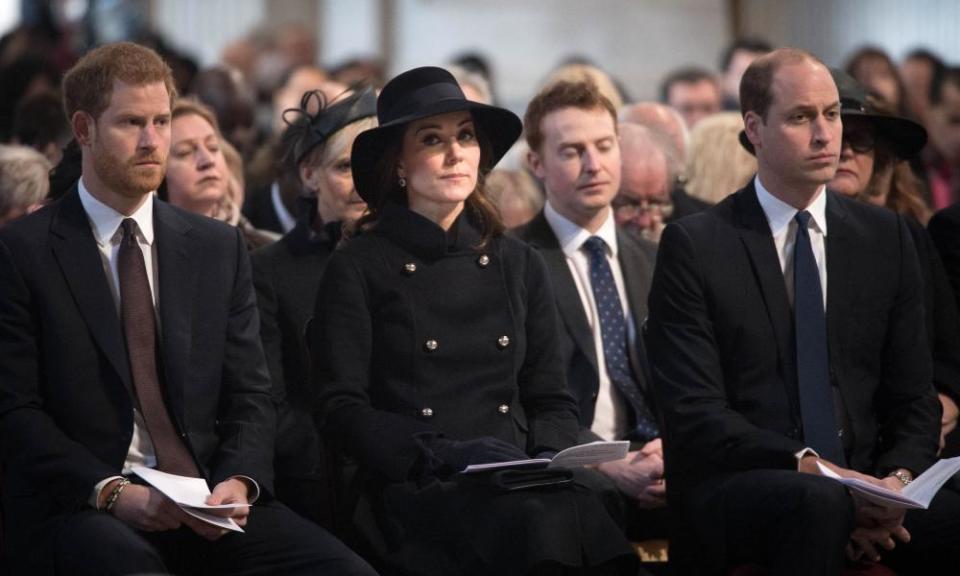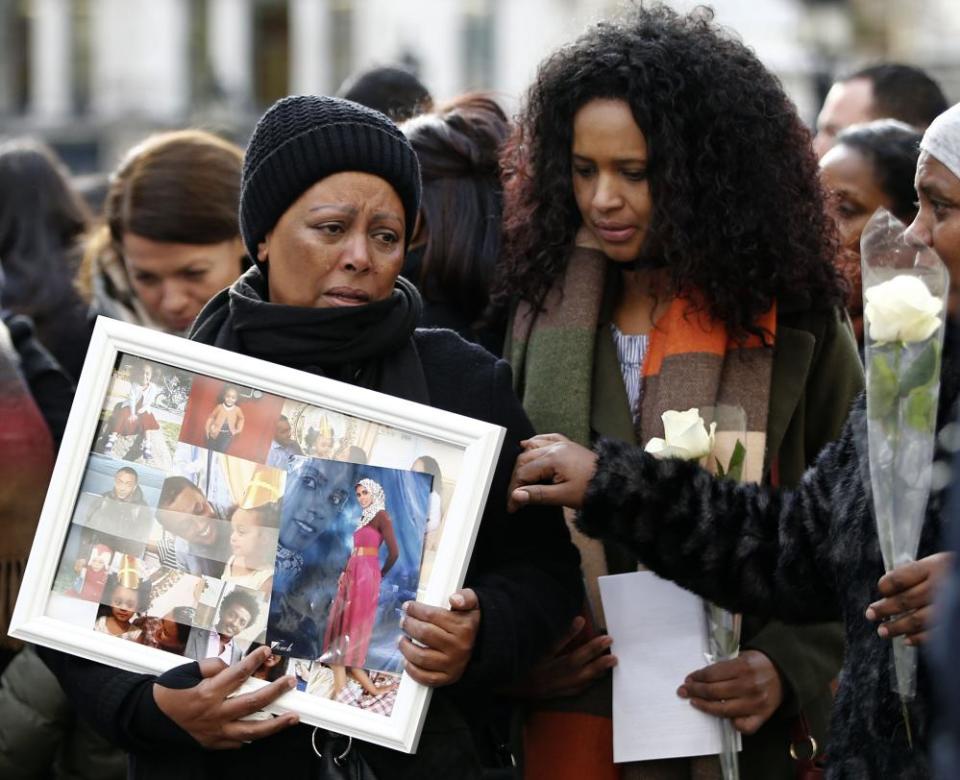Grenfell memorial: emotions raw as families and survivors mourn dead
Clutching white roses and photographs of lost loved ones, the survivors and the bereaved of the Grenfell Tower fire were joined by members of the royal family, faith leaders and the prime minister at St Paul’s Cathedral to mark six months since the catastrophe.
A hour-long national memorial service on Thursday, before probably the most diverse congregation ever seen at St Paul’s, saw emotions spill over, with many wiping away tears during music, prayers and a minute’s silence to remember the 71 people who died and hundreds made homeless.
More than 1,500 people gathered under the magnificent dome of St Paul’s, along with five senior royals: the Prince of Wales, Duchess of Cornwall, Duke and Duchess of Cambridge and Prince Harry. Theresa May was joined by the communities secretary, Sajid Javid, the Labour leader, Jeremy Corbyn, and the shadow home secretary, Diane Abbott.
The singer Adele and actor Carey Mulligan were also present, along with uniformed members of the emergency services, volunteers from the community, and children from local schools. The leader of Kensington and Chelsea council, Elizabeth Campbell, and her colleagues stayed away at the community’s request.

To open the service, a Catholic priest and an imam from North Kensington carried through the congregation a banner emblazoned with the green heart of Grenfell, which has become the symbol of the community.
David Ison, the dean of St Paul’s, welcomed those in the church and “all of you watching on national television, among whom are those painfully affected who could not face such a public event”. The service was screened at al-Manaar mosque and and St Clement’s church in North Kensington.
“In this service we come together as people of different faiths and none, as we remember before God those whose lives were lost, and pray for them to be at peace; as we are alongside brothers and sisters who have lost their homes and their community and those they love; as we commit ourselves to care for each other and to be united in the face of suffering and sorrow; as we seek each other’s help and resolve to build on our hopes for a future in which the tragedy that struck the people of Grenfell Tower will never happen again,” Ison said.

His words were followed by a Syrian musician playing the oud, a traditional instrument of the Middle East and north Africa, where many Grenfell residents had ties. A recording of survivors and the bereaved speaking was played. “So many questions to answer,” said one; “People want justice, they want someone to pay, most of these people are angry and their anger is understandable,” said another.
Their anger was acknowledged by the bishop of Kensington, Graham Tomlin, in his address. “Today, we ask why warnings were not heeded; why a community was left feeling neglected, uncared for, not listened to,” he said.
“Today we hold out hope that the public inquiry will get to the truth of all that led up to the fire at Grenfell Tower … and we trust that the truth will bring justice.”
But, he added, the extraordinary grassroots response to the disaster was “a glimpse of what our society could be like; a place where we were, for a brief moment, more concerned about our neighbour’s wellbeing than we were about our own.
“As we come to the end of this difficult year, as we celebrate Christmas, as we move into a new year, nothing can remove the memory of that night – nor do we want to forget those dearly loved people who were lost.
“And yet my hope and prayer is that this new year can bring new hope of a future; a vision of a city where we lose our self-obsession and listen and learn from places and people that we wouldn’t normally think of reaching out to.”
He added that he hoped the word Grenfell would transform over time from a symbol of “sorrow, grief or injustice” to “a symbol of the time we learned a new and better way: to listen and to love”.

Prayers were said by representatives of local faith organisations. The Al-Sadiq and Al-Zahra Girls Choir, all wearing white hijabs, performed a song called Inshallah and the Ebony Steel Band played Leonard Cohen’s Hallelujah.
Nadia Jafari, who escaped from the fire but lost her father, Ali Yawar Jafari, read a poem by the 13th-century Persian poet Jalal ad-Din Muhamm called Remember Me. Children from local schools scattered green paper hearts, a symbol of solidarity with the victims and survivors, around the altar.
After the service Jafari said she was close to tears when reading the poem. “It’s very, very hard. Still [my mother] cries, every day, every second when we are talking about our father; all the memories come out again. It’s six months and it’s still very hard for us,” she said.
As the service began, Kensington and Chelsea council observed a minute’s silence at its town hall. Campbell said she had not attended to “respect the wishes of those involved in the service”, adding: “I want them to know that we will be thinking of them.”

 Yahoo News
Yahoo News 
